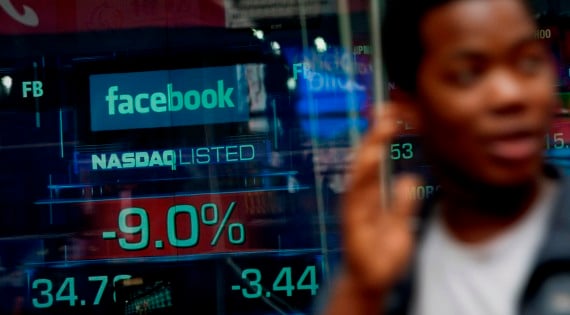Facebook Inc. shares fell to a new low, extending losses from the worst-performing large initial public offering during the past decade to more than 20 percent.
The stock fell 9.6 percent to $28.840 as of 4:00 p.m. ET, below the prior low of $30.94 on May 22. Facebook debuted on May 18 after underwriters sold shares at $38.
Facebook options trading began today, with volume for puts exceeding calls by 1.3-to-1, data compiled by Bloomberg show. More than 87,000 puts giving the right to sell traded. June $30 puts were the most-active contracts, with volume at 14,998. They were followed by June $34 calls and June $32 calls.
“People are disillusioned,” Matt McCormick, who helps oversee $6.2 billion at Bahl & Gaynor Inc. in Cincinnati, said in a telephone interview. He doesn't own shares of Facebook. “A lot of investors believed the hype,” he said. “In this type of volatile market environment, people are not going to take chances.”
Facebook shares climbed as high as $45 on May 18, when the shares ended the day with a price-earnings ratio of 83.1, making the Menlo Park, California-based company more expensive than 99 percent of Standard & Poor's 500 Index stocks. The company went public as the equity index was heading for its biggest monthly decline since September.
RELATED ITEM 10 IPOs that really flopped »
The IPO, which set a record for technology companies by raising more than $16 billion, produced the worst five-day return among the 10 largest U.S. deals of the past decade. The 13 percent loss through May 24 exceeded the 10 percent drop by MF Global Holdings Inc. in its first five sessions.
Facebook and Morgan Stanley, its lead underwriter, faced criticism for boosting the number of shares sold in the IPO by 25 percent to 421.2 million in the days before the deal. They also increased the asking price to $34 to $38 from $28 to $35.
The first day of trading was disrupted by the “poor design” of Nasdaq OMX Group Inc. (NDAQ)'s software for IPO auctions, Robert Greifeld, the chief executive officer of the exchange operator, said on May 20. The malfunction also prevented Nasdaq OMX from sending messages to brokerages confirming that clients' orders went through.
“Investors are incorporating the risks embedded in the stock,” Brian Wieser, a senior analyst at New York-based Pivotal Research Group LLC, said in a telephone interview today. He has a sell rating on the stock and a $30 share-price estimate. “A lot of people are trying to trade the stock on the basis of those expectations. Options will be a very robust marketplace with respect to Facebook.”
--Bloomberg News--







